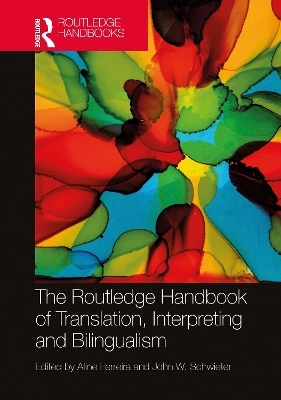
The Routledge Handbook of Translation, Interpreting and Bilingualism
Routledge (Verlag)
978-0-367-62349-4 (ISBN)
The Routledge Handbook of Translation, Interpreting and Bilingualism is the first handbook to bring together the related, yet disconnected, fields of bilingualism and translation and interpreting studies. Edited by leading scholars and authored by a wide range of established authorities from around the world, the Handbook is divided into six parts and encompasses theories and method, the development of translator and interpreter competence and cognitive, neuroscientific and social aspects.
This is the essential guide to bilingualism for advanced students and researchers of Translation and Interpreting studies and key reading on translation and interpreting for those studying and researching bilingualism.
Aline Ferreira is an associate professor of linguistics in the Department of Spanish and Portuguese at the University of California, Santa Barbara, where she is also director of the Bilingualism, Translation, and Cognition Laboratory and director of the Latin American and Iberian Studies Program. Her books include The Routledge Handbook of Translation and Linguistics (2018); The Routledge Handbook of Translation and Methodology (2022); and The Routledge Handbook of Interpreting and Cognition (forthcoming). John W. Schwieter is a professor of Spanish and linguistics and cross-appointed in psychology at Wilfrid Laurier University, and an adjunct professor of linguistics at McMaster University. He is also the director of the Language Acquisition, Multilingualism, and Cognition Laboratory and Bilingualism Matters at Laurier. His recent co-edited books include Second Language Acquisition Theory: The Legacy of Professor Michael H. Long (2022); Engaging in Critical Language Studies (2022); and The Cambridge Handbook of Working Memory and Language (2022); Together, Ferreira and Schwieter have co-edited Introduction to Translation and Interpreting Studies (2023); The Handbook of Translation and Cognition (2017); Psycholinguistic and Cognitive Inquiries into Translation and Interpreting (2015); and The Development of Translation Competence: Theories and Methodologies from Psycholinguistics and Cognitive Science (2014).
Part I
Introduction and overview of the Handbook
1. Interfaces of translation, interpreting, and bilingualism from cognitive perspectives
Aline Ferreira and John W. Schwieter
Part II
Theories and methods
2. The unique bilingual profile of translators and interpreters
Yanping Dong
3. Theories and models in cognitive bilingualism
Julia Festman and Gregory J. Poarch
4. Theories and models in Cognitive Translation and Interpreting Studies: paradigms and legacy concepts
Álvaro Marín García
5. Research methods in Cognitive Translation and Interpreting Stusdies and bilingualism
Przemysław Janikowski and Agnieszka Chmiel
Part III
Neurocognitive aspects of cognitive TIS and bilingualism
6. Interlingual reformulation as a window into the bilingual brain
Adolfo M. García and Boris Kogan
7. Physiological measures of language processes in translation and interpreting
Paweł Korpal and Ana María Rojo López
8. A critical role for Cognitive Translation and Interpreting Studies in the study of brain plasticity: evidence from young bilingual adults
Noelia Calvo
Part IV
Cognitive aspects of Translation and Interpreting Studies and bilingualism: architecture
9. Working memory in simultaneous and consecutive interpreting
Barbara Moser-Mercer
10. Interference control in interpreting
Hongming Zhao, Xiaocong Chen, and Yanping Dong
11. Cognitive processing of subtitles: charting the future by mapping the past
Sixin Liao and Jan-Louis Kruger
12. Identity, bilingualism, and Cognitive Translation and Interpreting Studies
Aline Ferreira and Viola Miglio
13. False belief, perspective taking, and Cognitive Translation and Interpreting Studies and bilingualism
Vanessa Diaz
14. Emotions in Cognitive Translation and Interpreting Studies
Ana María Rojo López and Catherine Caldwell-Harris
Part V
Cognitive-developmental aspects of translation and Interpreting Studies and bilingualism: dynamics
15. Cognitive Translation and Interpreting Studies and bilingualism from developmental aspects
Wolfgang Lörscher
16. Age, bilingualism, and cognition in translators and interpreters
Eleonora Rossi, Antonio Iniesta, and Megan Nakamura
17. Capacity, load, and effort in translation, interpreting, and bilingualism
Kilian G. Seeber and Rhona M. Amos
18. Cognitive flexibility in interpreting
Giulia Togato and Pedro Macizo Soria
Part VI
Aspects of translator and interpreter tasks and characteristics
19. Directionality in Cognitive Translation and Interpreting Studies
Aline Ferreira
20. Translation and interpreting in bilingual and monolingual communities
Christopher D. Mellinger
21. Translanguaging, Translation and Interpreting Studies, and bilingualism
Eriko Sato and Ofelia García
22. The role of the bilingual self in translation and interpreting
Michael S. Boyd and Chirine Haidar Ahmad
23. Cognitive Translation and Interpreting Studies, bilingualism, and heritage languages
Laura Gasca Jiménez
24. Training bilinguals to become translators
Nataša Pavlović and Boguslawa Whyatt
25. Training bilinguals to become interpreters
Weiwei Wang and Lihua Zhang
| Erscheinungsdatum | 11.10.2024 |
|---|---|
| Reihe/Serie | Routledge Handbooks in Translation and Interpreting Studies |
| Zusatzinfo | 4 Tables, black and white; 6 Line drawings, black and white; 5 Halftones, black and white; 11 Illustrations, black and white |
| Verlagsort | London |
| Sprache | englisch |
| Maße | 174 x 246 mm |
| Themenwelt | Geisteswissenschaften ► Sprach- / Literaturwissenschaft ► Sprachwissenschaft |
| ISBN-10 | 0-367-62349-8 / 0367623498 |
| ISBN-13 | 978-0-367-62349-4 / 9780367623494 |
| Zustand | Neuware |
| Informationen gemäß Produktsicherheitsverordnung (GPSR) | |
| Haben Sie eine Frage zum Produkt? |
aus dem Bereich


